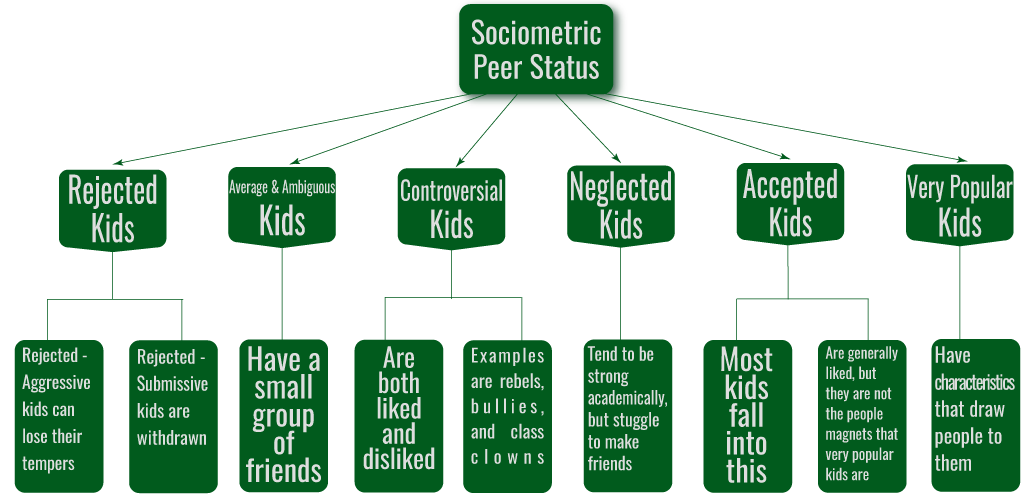Chapter 12: Play and Peer Relationships
Sociometric Status
Sociometric Status
Sociometric status is a measurement that reflects the degree to which someone is liked or disliked by their peers, which affects their ability to form relationships (Coie et al., 1982). This system can be used to examine children’s status in peer groups: status stability over time, the characteristics that determine their status, and the long-term implications of one’s popularity or rejection by peers (Lu Jiang & Cillessen, 2005).
The most commonly used sociometric system asks children to rate how much they like or dislike each of their classmates and uses these responses to classify them into five groups (Coie et al., 1982). This system was developed in 1982, but it is still used in developmental psychology today.

Figure 2. Sociometric peer statuses. Created using information from Coie et al., 1982.
Popular children are those liked by many of their peers and disliked by few (Coie et al., 1982). They tend to be cooperative, friendly, sociable, sensitive to others, and assertive without being aggressive. Among this group, there are two distinct levels of popularity. Very popular kids are highly charismatic and draw peers to them, while accepted kids are generally well-liked, but not quite as magnetic as very popular kids. Popularity is impacted by several factors such as attractiveness, cognitive abilities, confidence, empathy, and humility.
Rejected children are disliked by most of their peers and liked by very few (Coie et al., 1982). These individuals tend to be isolated and lonely, and are at higher risk for poor academic performance, delinquent behaviors, depression, and substance abuse (Lansford et al., 2014). There are two types of rejected children: Aggressive-rejected and withdrawn-rejected. Aggressive-rejected kids display hostile and threatening behavior, are physically aggressive, and disruptive (American Psychological Association, 2023). They often engage in bullying, withholding friendship, and excluding others. Withdrawn-rejected kids are wary, timid, anxious in social situations, and lack confidence (American Psychological Association, 2018b). They are at a higher risk of being bullied.
Controversial children are both liked and disliked by their peers (Coie et al., 1982). This group may possess characteristics of both the popular and the rejected group. They can sometimes be cooperative and social, but at other times aggressive and disruptive. They are often socially active and group leaders, but their peers may view them as arrogant and snobbish.
Neglected children are not especially liked or disliked by peers and tend to go unnoticed (Coie et al., 1982). As a result, they may be isolated and avoid confrontation and other aggressive interactions. Neglected children should undergo social skills training and be encouraged to join activities that can help them become noticed by their peers and make friends.
Average kids are liked by a small group of peers and not disliked by very many (Coie et al., 1982). Their scores fall between those of the popular and rejected children.

Figure 3. Sociometric Peer Status by Florida State College at Jacksonville is licensed under CC-BY 4.0
a measurement that reflects the degree to which someone is liked or disliked by their peers
children who are liked by many of their peers and disliked by few

